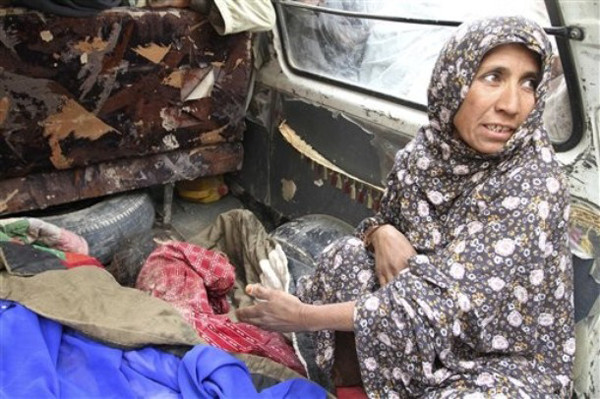Anar Gul gestures to the body of her grandchild, killed by Sergeant Robert Bales in Kandahar (Photo: AP)
On 11 March, United States Army Staff Sargeant Robert Bales went on a killing spree in Afghanistan. He barged into two houses in the pre-dawn hours and killed a total of 16 civilians, including nine children and several women. He then gathered and burnt some of the bodies then and there.
In the past 12 days, we have learned about everything that can be dug up about Robert Bales, including the blogposts his wife wrote about his lengthy tours. Huffington Post blogger Dean Obeidallah has written has written about the information overload regarding SS Bales and given quite extensive examples.
The process is called humanization. It's where the media takes someone in the news and inform the readers about everything you can possibly find about that person to paint a picture that the ordinary citizen can relate to. It's done so that you - the reader - can better understand the story.
But it's only reserved most of the time for...you guessed it --- humans.
And while I agree ---- no matter how terrible his crime, he's still human --- what disgusts me as an Afghan is the degree to which the victims of this massacre have been ignored. Imagine if this was a serial killer who committed this crime in a suburb of Chicago? By now, you'd have pictures of every victim, published in neat collages in every major newspaper in the US.
You'd have extensive interviews with family members, videos of the child's playground, his toys, his school books... But in this case, you don't. The mainstream media here has almost entirely ignored the victims. I mean, forget pictures, google search for their names and the only story you'd stumble upon in a large media outlet is on Al Jazeera - written by an Afghan reporter simply fed up with that situation.
As an Afghan reporter, I'm going to do just the same and simply republish the names here from the original article by Qais Azimy:
In honoring their memory, I write their names below, and the little we know about them: that nine of them were children, three were women.
The Dead:
1. Mohamed Dawood son of Abdullah
2. Khudaydad son of Mohamed Juma
3. Nazar Mohamed
4. Payendo
5. Robeena
6. Shatarina daughter of Sultan Mohamed
7. Zahra daughter of Abdul Hamid
8. Nazia daughter of Dost Mohamed
9. Masooma daughter of Mohamed Wazir
10. Farida daughter of Mohamed Wazir
11. Palwasha daughter of Mohamed Wazir
12. Nabia daughter of Mohamed Wazir
13. Esmatullah daughter of Mohamed Wazir
14. Faizullah son of Mohamed Wazir
15. Essa Mohamed son of Mohamed Hussain
16. Akhtar Mohamed son of Murrad Ali
You could add that Masooma means "innocent girl" and Payendo means "long-lasting". And Al Jazeera's Afghan journalists went further. They went on the ground and documented the suffering of the people They even went to Afghan President Hamid Karzai's meeting with those families to let the world know of the helplessness of not just the Afghan people, but also the Afghan Government is challenged by this tragedy.
The US mainstream media has people on the ground in Afghanistan. They also have access. Yet they have not documented names or pictures or stories. Afghan tragedies have been left for Afghans to cover, even when that tragedy is caused by an American.
Is it so difficult to republish just the names that from Al Jazeera in The New York Times? Or The Washington Post? Maybe put them on the back pages of CNN's website?
An incident like this leads Afghans to think that maybe the US media and elite --- including those running the Government --- don't look at Afghans the way they look at other peoples. While people need to know everything about a mass murderer, they might not require knowledge of the victims because they belong to a culture that is too primitive.
Yes, "primitive". That was the word used by National Review Online in an editorial, referring to Afghans and Afghan culture, as it pondered the Kandahar Massacre a few days ago.
An American soldier goes to Afghanistan and massacres 16 civilians inside their homes, then burns their bodies. And we are the ones who are primitive.
I have a world of respect for US soldiers in uniform. They are the best America has to offer. I think of my friend Ben, who served in Iraq and whose humorous stories on Facebook I greatly enjoy. Ben's the sort of guy you don't ever have to meet to love and respect. There are others, too, including those whom I have seen playing with Afghan children and making them laugh, But this post isn't about US soldiers. It is those for whom those young men and women are dying, but who are dying themselves. Is it too much to ask that they are treated with some respect by the US media?
This has happened before in America's wars. As General William Westmoreland's assessed the lives of Vietnamese in the documentaryHearts and Minds:
The Oriental doesn't put the same high price on life as does a Westerner...We value life and human dignity. They don't care about life and human dignity.
My friend Ahmad Shuja recently wrote for UN Dispatch:
The debate following the Kandahar massacre shows that Americans at home and in Afghanistan still don't quite understand the meaning of events in that country... Misreading the public reaction after repeatedly observing an overwhelmingly peaceful population means the international mission has some serious difficulties connecting with the people and drawing the right lessons.
Well, how do you connect with a people when most of your media does not seem to even regard them, well, as people?
*Since this article was drafted, The Wall Street Journal has published a story, with the names and the circumstances of some of the victims' deaths.
Follow Josh Shahryar on Twitter
